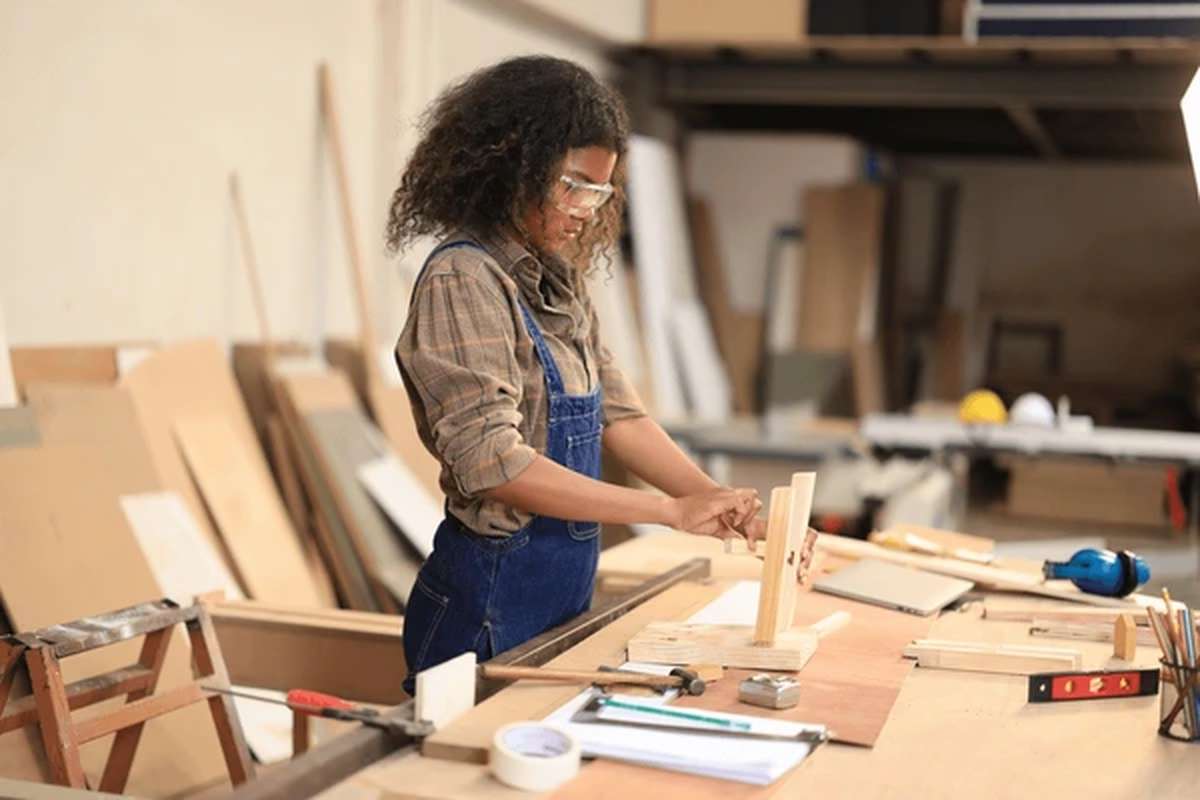Question 1: Can you tell us a bit about yourself and your background?
Five years ago, my spouse and I embarked on a journey to Canada with our one-year-old, intending to explore the world. However, plans changed with the news of another addition to our family.
We made Revelstoke, a charming town east of Vancouver, our temporary home for the next few years. In early 2022, we returned to England to obtain a driving license for our converted 40-foot school bus, now a snug motorhome. Unfortunately, our timing coincided with a nationwide lockdown, leading to an extended stay with family. With closed borders and our eldest starting school, we relocated again.
Now a family of five, I decided to pursue a creative career shift instead of returning to the hospitality industry, sparking my journey into woodworking.
Question 2: Did you have any woodwork experience before you started training?
Experimenting with DIY projects, I crafted climbing arches and ramps for the kids after picking up tips from YouTube tutorials. The real plunge into carpentry happened during the conversion of our school bus into a motorhome in Canada. Engulfed in cladding the interior with wood, we constructed bunk beds, wooden storage boxes, tables, and more. However, it wasn’t until I began a course with Authentic Furniture UK Classes that I grasped the distinction between ‘rough’ woodworking and the finesse required in fine furniture making.
Question 3: Why did you decide to take up a fine furniture-making course?
Becoming a parent heightened my awareness of the environmental impact of plastic toys that often end up discarded in landfills, taking centuries to decompose. This unsustainable cycle contradicted my vision of responsible living. My admiration for wooden toys from companies like Grimm’s and Ostheimer led me to invest in more durable and eco-friendly alternatives for my children.
Despite the higher cost, I embraced the idea that quality trumps quantity. Yet, moments, when I craved a specific toy that wasn’t available in wood, sparked a realization – why not design, craft, and offer these toys myself, bridging the gap between desire and sustainability?
Question 4: What made you choose Authentic Furniture UK Classes for your training?
In my quest for woodworking training, I explored various options, including university degrees, college courses, and apprenticeships. However, most proved impractical – either too lengthy, expensive, or lacking focus on the specific woodworking skills I desired.
With three kids, proximity and minimal disruption to my partner’s childcare duties were crucial. I stumbled upon Authentic Furniture UK Classes online, ticking all the boxes: a convenient 45-minute drive, optimal duration, flexible scheduling, and a reasonable cost.
Training locally with the team also meant tapping into his wealth of knowledge about crafting fine furniture in Surrey and sourcing the best local wood.
Question 5: Can you tell us more about the workshop and the courses?
The course spanned six weeks, from 9 am to 5 pm, Monday through Friday. Despite the workshop’s extended hours from 8 am to 7 pm, catering to those eager to practice or catch up, staying late conflicted with cherished family time.
Our small cohort comprised seven individuals – myself, another woman, and five men. The camaraderie among us was exceptional, contributing to a positive learning environment.
The workshop’s idyllic setting, with horses, farm dogs, and picturesque views of the Farnham countryside, added a touch of tranquility to the immersive woodworking journey.
Question 6: What was your experience using all the different kinds of tools in the workshop?
Encountering an array of unfamiliar tools at the onset of the course was both bewildering and intriguing. Some tools were entirely new to me, and upon receiving them in the mail, I’d unwrap the package with a perplexed expression, wondering, “What the hell is this?” Yet, as the six weeks unfolded, I became familiar with each tool and gained confidence in handling them.
The revelation was astounding – achieving an impeccable finish using just hand tools became a testament to the platform’s effective teaching.
Question 7: Which part of the course did you enjoy the most?
Every aspect of the course was enjoyable, but the daily infusion of new knowledge kept the experience consistently engaging. The diverse demographics of the group added another layer of enrichment – everyone was mature, and many shared a common goal of establishing a woodworking business, creating an instant camaraderie among us.
Question 8: What are the things you learned doing the course apart from woodworking?
Discussions about venturing into the business side of woodworking emphasized crafting unique pieces that distinguish themselves in the market. Recognizing the impracticality of competing with mass-produced items, we delved into the importance of offering locally crafted, sustainable, hand-made pieces with the potential to become heirlooms. This journey deepened my appreciation for my children and underscored the vital need for a harmonious work-life balance. Engaging in something solely for personal growth and rediscovering the joy of learning a new skill added a refreshing dimension to the entire experience.
Question 9: What are your plans?
I’m optimistic about the possibility of the team organizing a machining course in the future, as those additional skills would greatly benefit my aspirations in the field.
For now, my short-term plan involves establishing a workspace in a corner of my parents’ workshop. I’ll dive into three or four designs to assess their feasibility, balancing my time while the kids are still young. Once the kids are in school full-time, I envision spending more time nurturing my woodwork. If the business proves financially viable, the long-term plan is to build a dedicated workshop in our garden.
What excites me is creating the ‘whole package’ – from designing and crafting wooden toys and furniture for children to marketing, photography, and establishing a shop.
Question 10: Do you have any advice for those looking to do the same course?
Just go for it. Venturing into a new field, especially to establish a business, can feel daunting. However, enrolling in a course provides invaluable support from an expert in the craft, fostering a collaborative environment where you can share concerns and learn from fellow participants.
It’s a far more reassuring and less stressful approach compared to the self-taught route I initially took. The structured guidance from a dedicated course makes the learning journey more manageable and rewarding.



